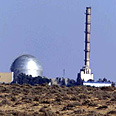
Nuclear reactor in Dimona
צילום: רויטרס
Iran, Israel clash at IAEA conference
Alluding to claims that Olmert acknowledged Israel's nuclear weapons program, delegate says, ' Those who call for the elimination of Israel have no moral standing when they criticize Israeli policies aimed at defending Israel's very existence'
Israel accused Iran of lying Friday while Tehran challenged the international community to send UN inspectors to probe its arch-rival's nuclear capabilities, in a rare and unusually bitter direct confrontation.
UN officials at a 148-nation meeting of the International said they had no memory of the two hostile nations ever engaging each other directly at previous meetings and said that development — and the unusually harsh tone of their statements — in part reflected Middle East tensions.
The exchange came after Iran's chief delegate Ail Asghar Soltanieh — like Arab delegates before him — said that Israeli Prime Minister Ehud Olmert had acknowledged last year that his country possessed nuclear weapons — something Olmert says he never did.
Soltanieh also criticized "the continuous silence of the US ... vis-a-vis the atrocities, aggression, bloodshed and violations of over 30 resolutions of the United Nations".
That, he said, is "shameful and (a) dark point in the history of the United Nations, and the IAEA and the modern century at large".
'Nuclear ambiguity doctrine'
In turn, Israeli delegate Israel Michaeli, alluding to claims that Olmert acknowledged Israel's nuclear weapons, said some previous speakers "continued to lie".
"Those who call for the elimination of Israel have no moral standing when they criticize Israeli policies aimed at defending Israel's very existence," Michaeli said.
Soltanieh then challenged the IAEA to send its inspectors into Israel "to verify who is telling the truth".
The harsh words came after an attempt by Iran and Arab nations to submit a resolution on "Israel Nuclear Capabilities and Threat" was blocked by the EU, the United States and other Western nations.
While the conference has enforcement powers, it has been increasingly politicized over the past decade by the Middle East dispute and more recently by Iran's nuclear ambitions.
Israel's doctrine of "nuclear ambiguity" — never formally confirming or denying that it has such weapons — is meant to scare potential enemies from considering an annihilating attack while denying them the rationale for developing their own nuclear deterrent.
Olmert caused a stir late last year with a remark he made to a German TV station, which was widely interpreted as confirming Israel has nuclear weapons. Olmert said he had been misunderstood.
On Thursday, the conference criticized Israel for refusing to put its nuclear program under international purview, with the United States alone in supporting the Jewish state.
Israel also voted against the resolution, while 53 nations backed it and 47 abstained. The remaining nations were absent for the highly unusual vote — only the second in the 16 years the issue has been on the agenda of the IAEA conference.
On Friday, a resolution that in part sought to expand IAEA powers to prevent nuclear proliferation passed by a comfortable margin, though Iran was among the nonaligned states voting against it.










